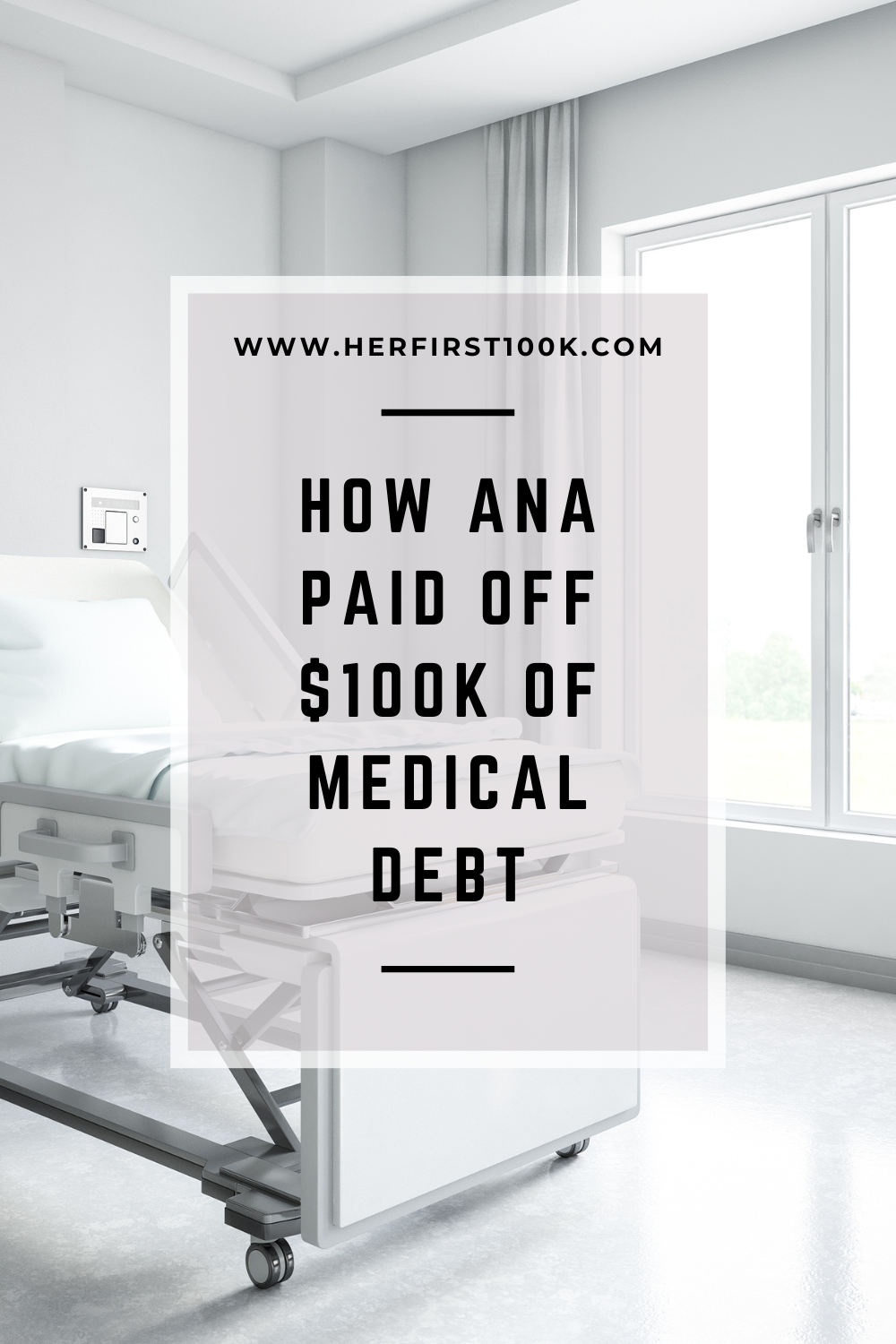The following article may contain affiliate links or sponsored content. This doesn’t cost you anything, and shopping or using our affiliate partners is a way to support our mission. I will never work with a brand or showcase a product that I don’t personally use or believe in.
There are 100 million adults with healthcare debt.
If you are the one in ten Americans that are currently carrying medical debt, then you know that medical debt is more than just another bill you have to pay each month; it’s a debt that causes financial strain, limits our economic future, and also comes with a high emotional and physical cost.
People who carry excessive debt are far more likely to experience depression, anxiety, and chronic illness than those who do not. And in a society where women make less money, have less invested in the stock market, and carry more overall debt than men, we are at a higher risk for experiencing debt-related health concerns.
The result? A cycle of accumulating and paying off medical debt that ultimately feels inescapable; while 41% of Americans continue to carry medical debt, very few have the resources or knowledge to navigate their medical debt payoff strategy in a way that truly works for their lifestyle while also actually minimizing their debt.
Thought you were alone in this cycle? Far from it: this is a narrative we hear frequently at Her First $100K™. So frequently in fact that today we are sharing the real life medical debt payoff story of Ana, an HFK community member, to explore how medical debt was affecting her life, the steps she took to negotiate and pay down her debt, and how paying off her medical debt ultimately helped her discover financial and personal freedom.
It was our first date and I had just excused myself to “go to the bathroom” (really I was going to text a friend and let them know how well the date was going).
I sent the text, washed my hands, and was just about to head back to the table when I stepped on a wet spot on the floor and slipped. The next thing I knew, my date and I were at the hospital and I was unknowingly going to take on $100,000 of medical debt.
“A catastrophic elbow fracture” were the exact words the doctor used.
I glanced over at Mike – my sweet date who I had just met – who smiled at me gently, encouragingly. I tried to smile back, but in my head I was frantically crunching numbers.
Hi, I’m Ana. Here I am uprooting a plant, much like the way that my medical debt tried to uproot my life.
What I thought would be a quick visit to the emergency room to get a cast suddenly turned into a three day hospital stay with around the clock care – a stay that would have to be paid out of pocket because I didn’t have health insurance.
At the time I was working in the service industry while running a couple of side hustles. Paying for health insurance seemed like an expensive waste of money since I was in my mid-twenties and perfectly healthy. That’s always when freak accidents like slipping in the bathroom while on a date catch up with you, isn’t it?
I remember receiving my first medical bill shortly after I was discharged. I read the hospital’s name on the front and knew that it would be a hefty price. It took me a while to open the envelope since, ya know, I was down an arm, and as I worked to open it I thought to myself, “it will be like $5,000…maybe $10,000. It will be expensive, but it won’t absolutely ruin me.”
I finally managed to open the bill and my jaw dropped. The number at the bottom of the page was over $100,000. Catastrophic was right.
I began to panic. My income wasn’t consistent between my jobs and I had no family that could help me financially. I had a limited financial education and was just getting by as it is. This was the kind of number that could uproot my entire life.
I remember thinking, “I am never going to pay this off. I am going to have this debt forever.”
There was a customer helpline number at the bottom of the bill, so I called to see if there was anything I could do to bring the total of my balance down. After a long phone conversation, I found out that I would be able to have some of my debt dismissed if I qualified for an income-based sliding scale pricing system.
I jumped on the opportunity – after all, I would have done anything to reduce the total balance of my debt. But what I didn’t realize was just how time consuming, difficult, and shameful this process would be.
In order to verify my income, I had to submit every kind of financial paperwork imaginable: W2’s, tax returns, paystubs, receipts, invoices – I even had to get signatures from my boss signing off on my stated income. Let me tell you, disclosing to your boss that you need their signature because you’re unexpectedly $100,000 in debt is humbling, to say the least.
After I jumped through all the hoops to verify my income, I found out that I qualified for the sliding scale pricing which brought my whopping $100,000 debt down to $88,000. It was a step in the right direction, but I was still far from being able to pay it all back.
I tried to return to normal life after my injury, but even fun events became overshadowed by my physical pain and debt-related anxiety.
I started making monthly payments of $10 just to keep the debt collectors from calling and accepted that living with debt-related anxiety was my new norm – I had resigned myself to being in medical debt forever.
I maintained this process for a few months while generally trying not to think about my debt – and I was doing pretty well until tax season came around. I filed my taxes and couldn’t wait to get my tax return. I was at a time in my life when I really needed that money.
But the days and weeks after filing my taxes began to add up, and there was no tax return in my mailbox. Feeling the financial strain of not having that tax return, I did what any person would do: I turned to the internet for answers.
It was then that I discovered that I would not be receiving a tax return that year. Because I had outstanding medical debt, the IRS automatically contributed my tax return to my debt repayment. I realized that even though I had been trying to outrun my medical debt with minimum payments and an “out of sight, out of mind” mentality, my debt was going to catch up with me one way or another.
I knew then that if I didn’t gain more control over my debt that it would ultimately control me. After all, my debt was beginning to affect my entire life.
Ever since taking on my medical debt, I had been required to put deposits down on just about everything – even my internet and energy services – because my debt was so high. I was only approved for a $500 credit card limit because of my debt, even though my credit score was over 700. I had avoided going to the doctor for follow-up appointments for my elbow – appointments I really needed – because I didn’t want to accumulate more medical debt. And I can’t even begin to convey the amount of stress and anxiety my debt created in my day-to-day life.
Needless to say, I needed to make a change.
I didn’t have the income to start making bigger payments on my debt, so my only shot at reducing the balance was by negotiating it down.
I knew that if I had any chance of negotiating this debt down, I needed to be persistent, kind, and on top of my shit. I started calling the hospital’s office every day and made a log of who I talked to, what we talked about, and when I called. During these calls, I would request information about my debt, explain why I wouldn’t be able to pay back the current amount, and ask for discounts.
I also requested an itemized receipt for everything that I was being charged for by the hospital so that I could compare prices between other hospitals in my area. When I found a provider that offered a service for a lower price than I received it, I would use this information as a basis for price negotiation with the hospital office staff.
After a couple weeks of consistent calls, I was notified that my debt had been reduced to $75,000.
I continued my process of daily calls and after a few more weeks it went down to $60,000.
And then it went down to $50,000.
I kept calling the hospital office and asking for discounts and debt forgiveness until my medical debt balance was reduced all the way down to $10,000 – just a tenth of what I was originally billed.
If I could go back in time, I would tell my former-self to start negotiating down my debt sooner. I had no idea that was even an option a few years ago.
While that $10,000 of extra debt was still significant, it was at least an amount that I could see myself paying off eventually overtime.
It was around this time that I also discovered Her First $100K. I learned how to set up a budget that made debt payoff a priority while also making it sustainable and work for my lifestyle.
Now I make consistent payments on my medical debt and am watching the total balance decrease every month, all while reaching my overall money goals and saving for my financial future.
I am now a few years into my medical debt payoff journey and there are some things I wish I knew sooner that would have made the process so much easier:
Medical debt is negotiable
I was able to reduce my medical debt by 90% through negotiating, but only after enduring months of debt-related stress and anxiety. Had I known earlier that it was possible to negotiate down my medical debt, I would have saved myself so much time, money, and mental anguish.
Do you have medical debt that you want to negotiate down? Check out The 100K Club, a where you can learn debt payoff strategies and create lasting money habits!
Ask for an itemized receipt right away.
This will show you everything that you are being billed for and can be a lifesaver when it comes to negotiating down your debt. After all, there’s no reason why you should be billed like, $55 for one Ibuprofen tablet.
Take advantage of hospital price transparency
Every hospital in the US is required to provide pricing information about all of the items and services that they offer. This information is so helpful when negotiating your medical debt especially if you find another provider in your area offering the same item/service at a lower price.
I found FAIR Health Consumer and Healthcare Bluebook to be especially helpful when hunting for transparent healthcare prices.
Do not under any circumstances try to outrun your medical debt
Trust me, I’ve been there: watching the stack of medical bills pile up on the counter and constantly ignoring calls from debt collectors. It’s exhausting and stressful and causes so much anxiety, and it does nothing to help your financial situation.
Even if you don’t have the financial means to tackle your medical debt right now, there are still things you can do to help your situation. I suggest picking up the phone and calling your healthcare lender. Not only does this give you the chance to explain your personal situation and ask for assistance/discounts/debt forgiveness, but I learned that calling your lender will postpone your debt from going to collections, which is especially advantageous if you are in a tight spot with your money.
Get everything in writing
I accumulated $100K in medical debt due to a freak accident, so I didn’t have the chance to shop around for providers. BUT if you can plan your medical treatment in advance, make sure that you get statements from your doctor and your insurance in writing stating the cost of the procedure and what will/will not be covered by insurance.
Not only will this give you the price transparency you need to budget for the treatment, but it can also protect you in the case that your provider tries to overcharge you or your insurance tries to change their coverage.
Now, I’m finally living my best, financially-free life.







